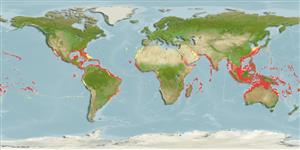>
Eupercaria/misc (Various families in series Eupercaria) >
Priacanthidae (Bigeyes or catalufas)
Etymology: Heteropriacanthus: Greek, heteros = other + Greek, prion = saw + greek, akantha = thorn (Ref. 45335).
More on author: Lacepède.
Environment: milieu / climate zone / depth range / distribution range
Οικολογία
Θαλασσινό(ά) Υφαλόφιλο(α); εύρος βάθους 3 - 300 m (Ref. 27000), usually 3 - 35 m (Ref. 40849). Subtropical; 33°N - 32°S, 180°W - 180°E
Atlantic and SW Indian Ocean: restricted. Former circumglobal distribution now accounted to former synonyms H. carolinus (widespread in the Indo-Pacific region) and H. fulgens (northeastern Atlantic Ocean).
Μέγεθος / Βάρος / Age
Maturity: Lm ? range ? - ? cm
Max length : 50.7 cm TL αρσενικό/απροσδιόριστο; (Ref. 9990); common length : 20.0 cm SL αρσενικό/απροσδιόριστο; (Ref. 55763); μεγ. δημοσιευμένο βάρος: 2.7 kg (Ref. 9990)
Ραχιαίες άκανθες (συνολικά) : 10; Μαλακές ραχιαίες ακτίνες (συνολικά) : 12 - 13; Εδρικές άκανθες: 3; Μαλακές εδρικές ακτίνες: 13 - 14. Silvery pink, mottled red or solid red in color; median fins with faint dark dots. Pelvic fins dusky or pale and without distinct spots (Ref. 4328). Section of preopercle behind canal striated and without scales (Ref. 26938).
Common in lagoon and seaward reefs, primarily around islands. Under or near ledges by day (Ref. 9710). Benthopelagic (Ref. 58302). Juvenile pelagic (Ref. 9335). Nocturnal (Ref. 5213), feeding mainly on octopi, pelagic shrimp, stomatopods, crabs, small fish, and polychaetes. Solitary (Ref. 5213). During the day usually occurs singly or in small groups but at dusk it may gather in large numbers (Ref. 37816). Known to produce sound. Marketed fresh (Ref. 3800). Minimum depth reported taken from Ref. 30874.
Life cycle and mating behavior
Maturities | Αναπαραγωγή | Spawnings | Egg(s) | Fecundities | Προνύμφες
Fernandez-Silva, I. and H.-C. Ho, 2017. Revision of the cicrumtropical glasseye fish Heteropriacanthus cruentatus (Perciformes: Priacanthidae), with resurrection of two species. Zootaxa 4273(3):341-361. (Ref. 115564)
IUCN Red List Status (Ref. 130435)
Threat to humans
Reports of ciguatera poisoning (Ref. 30911)
Human uses
αλιεία: περιορισμένης εμπορικότητας; Ενυδρείο: Εμπορικό(ά)
Εργαλεία
Special reports
Download XML
Διαδικτυακές πηγές
Estimates based on models
Preferred temperature (Ref.
123201): 23.3 - 29, mean 27.4 °C (based on 2452 cells).
Phylogenetic diversity index (Ref.
82804): PD
50 = 1.0000 [Uniqueness, from 0.5 = low to 2.0 = high].
Bayesian length-weight: a=0.01622 (0.01014 - 0.02593), b=2.88 (2.75 - 3.01), in cm total length, based on LWR estimates for this species & (Sub)family-body (Ref.
93245).
Τροφικό Επίπεδο (Ref.
69278): 3.6 ±0.2 se; based on diet studies.
Ελαστικότητα (Ref.
120179): Μεσαίο(α), ελάχιστος χρόνος για διπλασιασμό πληθυσμού 1,4 - 4,4 έτη (Preliminary K or Fecundity.).
Fishing Vulnerability (Ref.
59153): Moderate vulnerability (40 of 100).
Nutrients (Ref.
124155): Calcium = 26.8 [15.1, 45.6] mg/100g; Iron = 0.664 [0.388, 1.058] mg/100g; Protein = 19.8 [18.7, 20.7] %; Omega3 = 0.249 [0.153, 0.401] g/100g; Selenium = 23.3 [12.4, 43.1] μg/100g; VitaminA = 51.3 [19.6, 136.6] μg/100g; Zinc = 0.625 [0.427, 0.901] mg/100g (wet weight);
